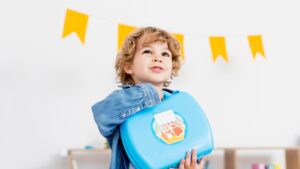
Why Do Routines Matter for Preschoolers?
At Love2Learn, we believe that young children flourish in environments where they feel safe, supported, and in control. One of the most powerful ways we foster this sense of security is through consistent daily routines.
While adults may crave variety and spontaneity, children actually thrive on predictability. Routine gives them a sense of what comes next, which builds confidence and eases anxiety. When children know what to expect, they’re more likely to engage, cooperate, and focus.
How Love2Learn Creates a Structured Yet Flexible Day
Our classroom schedules are thoughtfully designed to create a rhythm children can rely on. From morning greetings to lunch time, from circle time to outdoor play, every part of the day has its place. Even our transitions—between activities or from play to rest—are intentionally supported with songs, visual cues, and gentle reminders.
For example:
- Each morning includes a warm welcome and a calm, predictable morning circle time.
- Meals are served at the same time each day, giving children’s bodies and brains what they need to stay regulated.
- Nap time is not just a break—it’s a crucial opportunity to recharge, framed by soft music and cozy blankets.
- Even goodbyes are part of our routine, offering a clear end to the day and helping children separate with ease.
These daily rhythms provide an emotional anchor that allows our children to explore, learn, and grow confidently.
Tips for Establishing a Routine at Home
We know that mornings and evenings at home can sometimes feel chaotic. But just like in the classroom, consistent routines can help reduce power struggles and support better behavior at home. Here are a few simple tips:
- Stick to the same wake-up and bedtime every day—even on weekends.
- Use visual schedules or checklists for young children who are learning to follow steps (like getting dressed or brushing teeth).
- Build in time for connection: a short story, a cuddle, or a family meal can be powerful parts of your daily rhythm.
A Foundation for Growth
At Love2Learn, structure doesn’t mean rigidity—it means reliability. Within the framework of our daily routines, children find the freedom to explore, create, and play. And when they feel safe and seen, that’s when the real learning begins.
Schedule a Tour at Love2Learn
Curious about how our daily routine can support your child’s growth? Schedule a tour at Love2Learn Early Learning Center in Mechanicsburg and see our thoughtful approach in action.
References
Center for Child and Family Health. (n.d.). Routines for kids: Why they matter and how to create them. Zero to Thrive. Retrieved April 15, 2025, from https://zerotothrive.org/routines-for-kids/
Head Start Early Childhood Learning & Knowledge Center. (n.d.). Importance of schedules and routines. U.S. Department of Health and Human Services. Retrieved April 15, 2025, from https://eclkc.ohs.acf.hhs.gov/about-us/article/importance-schedules-routines
Morris, A. S., Mattera, S. K., & Knudsen, E. I. (2022). The role of routines in child development. Journal of Family Theory & Review, 14(2), 249–267. https://doi.org/10.1111/jftr.12549
Raising Children Network. (n.d.). Daily routines: Benefits for your child and family. Retrieved April 15, 2025, from https://raisingchildren.net.au/preschoolers/behaviour/behaviour-management-tips-tools/routines
Seattle Children’s Hospital. (n.d.). Kids thrive on routines. Retrieved April 15, 2025, from https://www.seattlechildrens.org/health-safety/parenting/kids-thrive-routines/
Virtual Lab School. (n.d.). Creating routines in early childhood classrooms. Retrieved April 15, 2025, from https://www.virtuallabschool.org/preschool/learning-environments/lesson-5
Zero to Three. (n.d.). Creating routines for love and learning. Retrieved April 15, 2025, from https://www.zerotothree.org/resource/creating-routines-for-love-and-learning/





